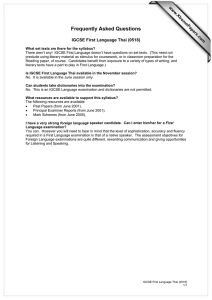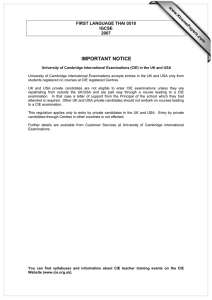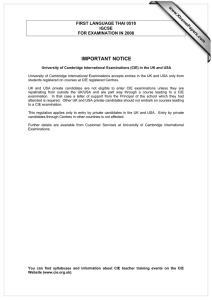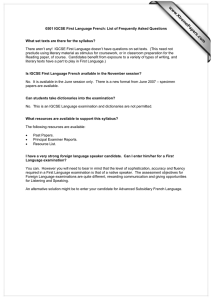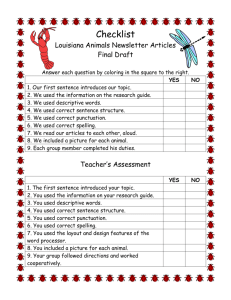Syllabus International General Certificate of Secondary Education
advertisement
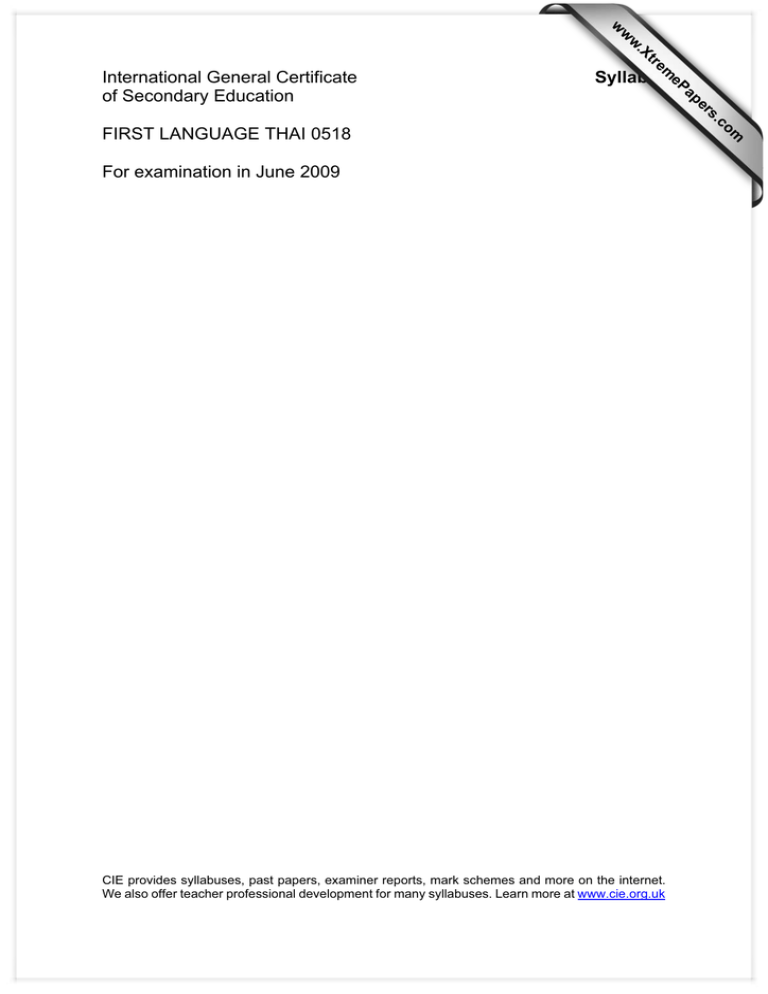
w w e tr .X w Syllabus CIE provides syllabuses, past papers, examiner reports, mark schemes and more on the internet. We also offer teacher professional development for many syllabuses. Learn more at www.cie.org.uk om .c For examination in June 2009 s er FIRST LANGUAGE THAI 0518 ap eP m International General Certificate of Secondary Education First Language Thai Syllabus code 0518 This syllabus is available in the June examination only. CONTENTS Page INTRODUCTION 1 AIMS 1 ASSESSMENT OBJECTIVES 2 ASSESSMENT 3 CURRICULUM CONTENT 4 GRADE DESCRIPTIONS 5 FIRST LANGUAGE THAI IGCSE 2009 INTRODUCTION International General Certificate of Secondary Education (IGCSE) syllabuses are designed as twoyear courses for examination at age 16-plus. All IGCSE syllabuses follow a general pattern. The main sections are: • Aims • Assessment Objectives • Assessment • Curriculum Content. The IGCSE subjects have been categorised into groups, subjects within each group having similar Aims and Assessment Objectives. First Language Thai falls into Group I, Languages, of the International Certificate of Education (ICE) subjects. AIMS The aims of the syllabus are the same for all students. The aims are set out below and describe the educational purposes of a course in a First Language for the IGCSE examination. They are not listed in order of priority. The aims are to: 1 enable students to communicate accurately, appropriately and effectively in writing; 2 enable students to understand and respond appropriately to what they read; 3 encourage students to enjoy and appreciate the variety of language; 4 complement the students’ other areas of study by developing skills of a more general application (e.g. analysis, synthesis, drawing of inferences); 5 promote the students’ personal development and an understanding of themselves and others. 1 FIRST LANGUAGE THAI IGCSE 2009 ASSESSMENT OBJECTIVES The ten assessment objectives in First Language have been grouped according to the three skill areas tested by the examination as follows: A READING AND DIRECTED WRITING Students should be able to: 1 understand and convey information; 2 understand, order and present facts, ideas and opinions; 3 evaluate information and select what is relevant to specific purposes; 4 articulate experience and express what is felt and what is imagined; 5 recognise implicit meaning and attitudes; 6 communicate effectively and appropriately. B CONTINUOUS WRITING Students should be able to: 2 order and present facts, ideas and opinions; 4 articulate experience and express what is felt and what is imagined; 6 communicate effectively and appropriately. C USAGE Students should be able to: 7 exercise control of appropriate grammatical structures; 8 understand and employ a range of apt vocabulary; 9 demonstrate an awareness of the conventions of paragraphing, sentence structure, punctuation and spelling; 10 show a sense of audience and an awareness of register and style in both formal and informal situations. SPECIFICATION GRID The relationship of the assessment objectives to the scheme of assessment is set out below. Assessment Objective 1 2 3 4 5 6 7 8 9 10 2 3 3 3 3 3 3 3 3 3 3 3 3 3 — 3 — 3 3 3 3 3 Component 2 FIRST LANGUAGE THAI IGCSE 2009 ASSESSMENT SCHEME OF ASSESSMENT All candidates take Papers 2 and 3 and are eligible for the award of grades A* to G. The papers in the assessment are as follows: Paper 2 (2¼ hours) Reading and Directed Writing Paper 3 (1¼ hours) Continuous Writing WEIGHTING OF PAPERS Paper Weighting 2 60% 3 40% DESCRIPTION OF PAPERS The question papers will be set entirely in the target language. Dictionaries are not permitted. Paper 2 Part 1 There will be two passages. Two questions will be set, one of which may be subdivided. The first will test candidates’ ability to select, compare and summarise specific information from both passages; the second question will invite a response to the passages in a variety of forms, for example a selective summary, a letter, a report, a speech, a script of a conversation or broadcast, a continuation of a story, an expressive development of an idea in the passage, etc. Part 2 This part will test candidates’ ability to use and develop given information in another form. (For examples see above, Paper 2, Part 1.) Paper 3 A selection of nine titles will be provided calling for an imaginative, narrative or argumentative response in an appropriate style. Candidates will be required to choose one assignment and will be advised to write 350-500 words. 3 FIRST LANGUAGE THAI IGCSE 2009 CURRICULUM CONTENT All candidates follow the same curriculum. ASSESSMENT OBJECTIVES All students should be able to: A Reading and Directed Writing - demonstrate understanding of extended texts - scan for and extract specific information, organise material and present it in a given format - show some sense of audience and awareness of style - identify main and subordinate topics, summarise, paraphrase, re-express - recognise and respond to simple linguistic devices including figurative language - edit or elaborate the work of others Students who are aiming for Grades A* to C, in addition should be able to: - show a more precise understanding of extended texts - recognise the relationship of ideas, arrangement of concepts - draw inferences, evaluate effectiveness, compare, analyse, synthesise - recognise and respond to more sophisticated linguistic devices B Continuous Writing - express thoughts, feelings and opinions in order to interest, inform or convince - demonstrate adequate control of vocabulary, syntax and grammar, punctuation and spelling - show a wider and more varied sense of audience and context and an awareness of different styles - demonstrate a sophisticated use of vocabulary and structures C Usage - exercise care over punctuation and spelling - write in accurate simple sentences - attempt a variety of sentence structures - recognise the need for paragraphing - demonstrate accuracy in punctuation and spelling - write accurate complex sentences - employ a varied sentence structure - use an appropriate vocabulary - show some sense of audience and awareness of style 4 - write in well constructed paragraphs - use an imaginative and varied vocabulary - show a clear sense of audience and awareness of style FIRST LANGUAGE THAI IGCSE 2009 GRADE DESCRIPTIONS A Grade A candidate has demonstrated expertise in: • understanding and communicating information at both a straightforward and a complex level; • understanding facts, ideas and opinions, and ordering and presenting them with clarity and accuracy; • evaluating material from texts and selecting and presenting in detail what is relevant for specific purposes; • describing and reflecting upon experience and detailing and analysing effectively what is felt and what is imagined; • recognising implicit meanings and attitudes of a writer; • showing a clear sense of audience and an understanding of appropriate uses of language; • writing in well constructed paragraphs, using a full range of appropriate sentence structure and showing accuracy in spelling and punctuation. A Grade C candidate has demonstrated competence in: • understanding and conveying information both at a straightforward level and at a more complex level; • understanding basic facts, ideas and opinions and presenting them with a degree of clarity and accuracy; • evaluating material from texts and selecting what is relevant for specific purposes; • describing and reflecting upon experience and expressing effectively what is felt and what is imagined; • recognising the more obvious implicit meanings and attitudes of a writer; • showing a sense of audience and an awareness of appropriate use of language; • writing in paragraphs, using sentences of varied kinds and exercising care over spelling and punctuation. A Grade F candidate has demonstrated competence in: • understanding and conveying information at a straightforward level; • understanding basic facts, ideas and opinions, and presenting them with a degree of coherence; • selecting material from texts and commenting upon it at a literal level; • describing experience in concrete terms and expressing intelligibly what is felt and what is imagined; • recognising clear meanings and explicit attitudes of a writer; • showing awareness that language is used in different ways in different circumstances; • writing at least in simple sentences – weaknesses in spelling and punctuation and the construction of complex sentences will be apparent, but will not seriously impair communication. 5
